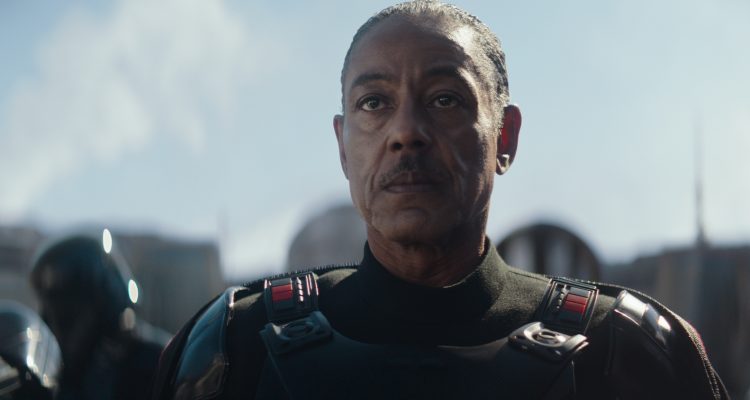Following Giancarlo Esposito’s deep dive into Gus Fring for Awards Focus’ Better Call Saul Week, the two-time Emmy nominee discusses his brilliant work in three series currently in Emmy contention: Disney +’s The Mandalorian, Amazon’s The Boys, and EPIX’s Godfather of Harlem.
Awards Focus: Let’s talk about The Boys, another fantastic show in which you play the role of Mr. Edgar. What kind of background did they give you for the role?
Giancarlo Esposito: Eric Kripke, the creator of that show, sends me something every year for my birthday. I really love working with him ever since Revolution. Anyways, my character, Stan Edgar, is a guy who runs Vought International. He has a political side as you might expect.
What I love playing about him is that I don’t normally think too politically – but in the back of my mind, he makes me feel that aspect. He can be stern and be fierce. I like that combination of characters traits, and overall, The Boys gives you a lot of fun things to play.
AF: What makes it so good, in your opinion?
Esposito: Well, you’re dealing with a little bit of an off-the-wall concept that has just become such a huge hit because we really care about the subject matter that we’re dealing with. Yeah, we’ve got superheroes, but they’re human beings and they have egos and they have feelings and they have families. I think that the message we’ll get as we move through Stan’s arc, is that the world and life and you are all a commodity. Consequently, there are broader ambitions there, in protecting the company, that have to do with the wellbeing of the world as a whole. I’m having so much fun doing that show.
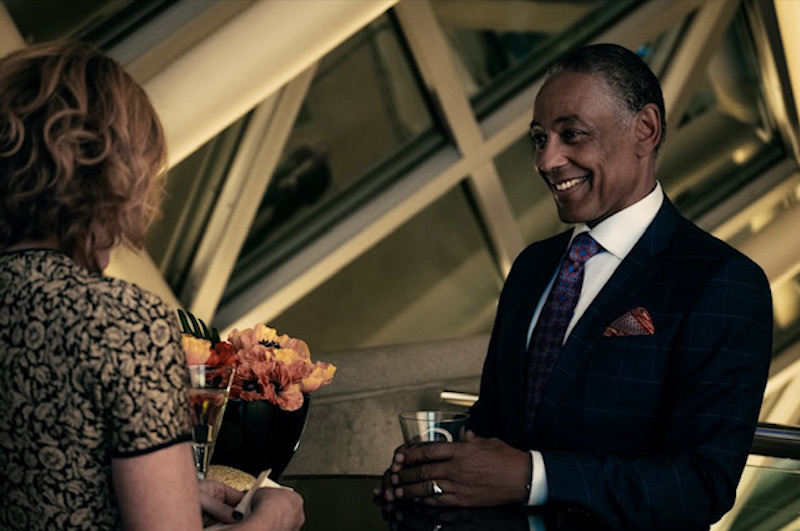
AF: Anthony Starr is tremendous as Homelander in season one, sharing the majority of his Vought corporate scenes with Elisabeth Shue’s character. With her untimely passing, it seems that you’re set to share the screen with Homelaander. What was it like to work with Anthony Starr?
Esposito: I’m studying Anthony right now, because I’ve been binge watching Banshee and he’s just such an excellent actor, as is my buddy Frankie Faison who plays opposite Anthony and stars in Banshee as well.
My first impression came from a few rather crispy scenes we had together, Anthony is an actor who can really stand out, I mean, the guy’s wearing a suit with a cape, for Christ’s sake. Now, I know about wearing a cape because I’m doing a show where I work with one as well (The Mandalorian). I know it’s a funny thing to look at, but I’m telling you, Anthony is such an incredible actor that I’m half expecting him to fly away in those moments without the special effects.
AF: The character of Moff Gideon arrives at the end of season one in The Mandalorian, and much like Mr. Edgar’s season one appearance in The Boys, very little is revealed to the audience. When you were crafting the character, were you given additional notes about Moff Gideon’s arc or backstory?
Esposito: When talking to a genius like Jon Favreau, I realized he has so many story points figured out in his head that harken back to the original Star Wars universe. Given that it was intended to be a space Western that’s linked to the mythology of Joseph Campbell and the hero’s journey, I had to think, “What is Moff Gideon’s hero’s journey within this particular story?”
George Lucas really loved Joseph Campbell. And so his stories are about the power of mythology and how they move us to spiritual places and teach us why we’re here. In particular, there’s a focus on life as a journey. And that’s what The Mandalorian is about.
Moff Gideon is mysterious, which allows me to ask who he is, what are his obstacles? What are his true intentions? What don’t we know? Why does he want this child? For me, he is a master manipulator in many ways, because he comes from the antiquated, absolutely imploded society of the Empire. But he still has a desire to create order and peace. So we don’t know what he wants with this child, yet. We don’t know what his intentions are. But we have to assume that he’s trying to restore some kind of order because his character is a warden in this particular part of the galaxy.
AF: Jonathan Banks mentioned how much he enjoyed his street fighting scenes this season in Better Call Saul, saying he could stop thinking and let loose. With the character of Moff Gideon, it’s revealed that you have the Darksaber in your possession. Have you trained to use it?
Esposito: You know, I’ve always wanted to fence since when I was thirteen. When I was in New York, I wanted my mother to get me into the New York Fencing Academy, but I was just so busy at the time doing a Broadway show. So when thinking about the light saber and wielding it, I just figured out how it fit with me.
There are a couple of versions of it depending on what we’re shooting, so they could be lighter or heavier in weight. I always felt like it was a samurai sword in many ways, but even more powerful because you can wield its strength in a more graceful and gentle way. Although I’ve never really fenced, I did work with some swordplay before, so I just prepared myself by practicing with a small broom, because it’s all about respecting the handle, but then understanding that the saber is much longer than that.
When you’re practicing at home, you should be careful. This is the first time the Darksaber has found its way to live action, and I’m very glad to be part of that. Fans are going to be really excited to see what I do with it this next season.
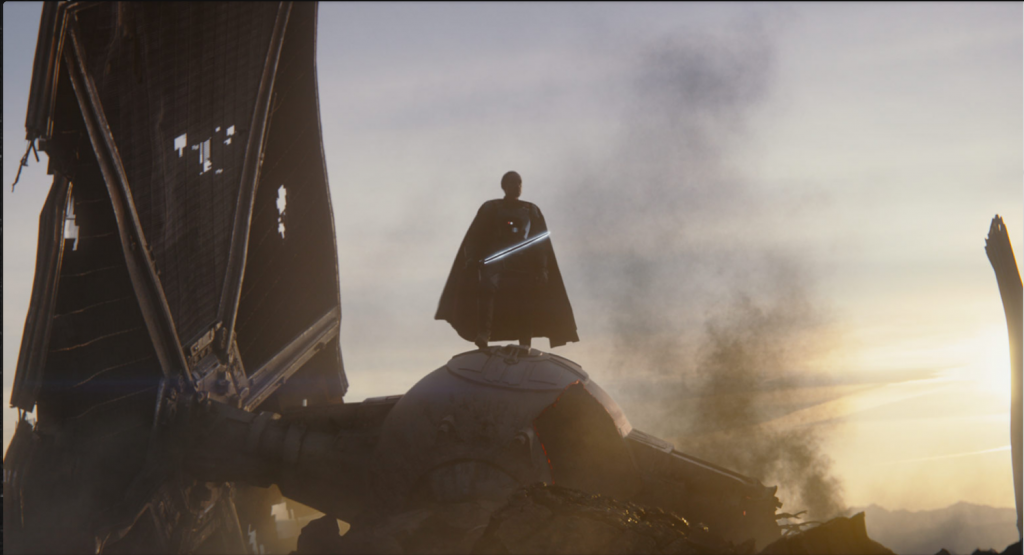
AF: For The Mandalorian, you got to work with Taika Waititi, who is on a phenomenal rise in the industry as a writer, actor, and director. What insights can you share about working with him?
Esposito: Taika is a unique personality, and he has an incredible eye. He likes to always be comfortable wherever he is. Whether he’s in front of the monitor or on the set, he’s always himself. He’s a genius when it comes to timing, in his work as a director and an actor, it’s unparalleled. And it’s quirky and different.
One day he was sitting on a couch, because he didn’t want a director’s chair, and he would keep jumping up and coming to me on set, and I had the scene where I had to go on top of the Tie fighter with the Darksaber, and I had done it a few times, but I wanted it to look really great. So we kept messing around with my positioning.
You have to understand, I’m standing on an orb, thirty feet in the air, and the only way to get up there is by scaffold.The first couple times I climbed all the way up so we could get the master of it, but then they had to move all of the cameras. I remember coming down, and Taika asks for the Darksaber. Holding the Darksaber, he starts moving his feet back and forth to these different positions. I asked Taika what he was thinking, and he explained how he was trying to play with the position of the feet to get a better stance for the character.
Taika is a very physical, hands on director. He’s always trying to feel out what position might be the strongest for his particular shot. Normally, when a director does that, an actor would be against it because they don’t want physical notes – you want to be organic, you want to be able to feel the power of the moment. But Taika’s work there helped me realize how things looked from his perspective, and from the camera’s perspective. And I think that’s kind of brilliant. Normally I might let that get in my way, but I took Taika’s energy and ran with it. He’s a visual storyteller who encompasses physical comedy and a little spice of the outrageous into a very real circumstances. I just think Taika is brilliant.
AF: Your versatility is on full display with the your embodiment of Adam Clayton Powell Jr. on EPIX’s Godfather of Harlem. What went into that larger-than-life character? How was your experience working on that series and playing the real life politician?
Esposito: I’m honored to be working with Chris Brancato, Paul Eckstein, and Forest Whitaker. They’re telling a really beautiful story about a very interesting time in our history. And the brilliance of telling the story in a different way from the traditional documentary or movie-of-the-week form, is how they’ve thrown contemporary elements into telling the story. For example, the music, it’s so attention-grabbing and interesting. Personally, you start to empathize with these characters who were fighting for civil liberties.
As my character, Adam Clayton Powell Jr., was fighting for what was just for all people, not just black people. So it was a great honor and responsibility to play him in this riveting story. In 1963, in New York, he was a reverend, a minister, and a congressman, but he was also someone who was fun and loved life. When I first looked at the photograph of him I knew who he was, from my childhood. That part of Harlem, in Westchester County, my mother worked at a soda fountain that was on the same street as the Apollo Theater, and a few blocks away from the Abyssinian Baptist Church, where Powell was a preacher.
After I read the pilot script, I was very intrigued and excited collected every piece of information that I could about his life. When we got going on the series, I revealed my connection to Powell to the writers, Paul Eckstein and Chris Brancato. They started to see how much I knew about Powell. One day I had a 50-page manuscript, with more than one of his speeches, with all of his accomplishments through his 868 bills in Congress, with all of the things he wrote, with papers on his career as a lawyer. I’d already studied video of him and I felt a great responsibility playing a character who did what Adam Clayton Powell Jr. did with his life.
AF: How did all that knowledge impact your portrayal of the character?
Esposito: By the time I got to the set, I was very well educated on Powell as I’ve said. It felt like he could pass as a white Southern Dixiecrat by the way he spoke, so I adjusted my diction to portray that. He was a great orator which made him a great preacher, yet he loved women, smoking, and drinking, and he wasn’t afraid to say, “This is who I am.” I just find that kind of character to be very exciting.
So while our story is about Bumpy Johnson (Forest Whitaker), this criminal element of Harlem and his journey after getting out of Alcatraz and coming back to take over the streets again, you also have this politician, who was a good man even amidst the occasional controversy. Bumpy Johnson wants Powell to act on his directives, but black man to black man, Powell’s not having it. He’s gonna do what’s right for the people.
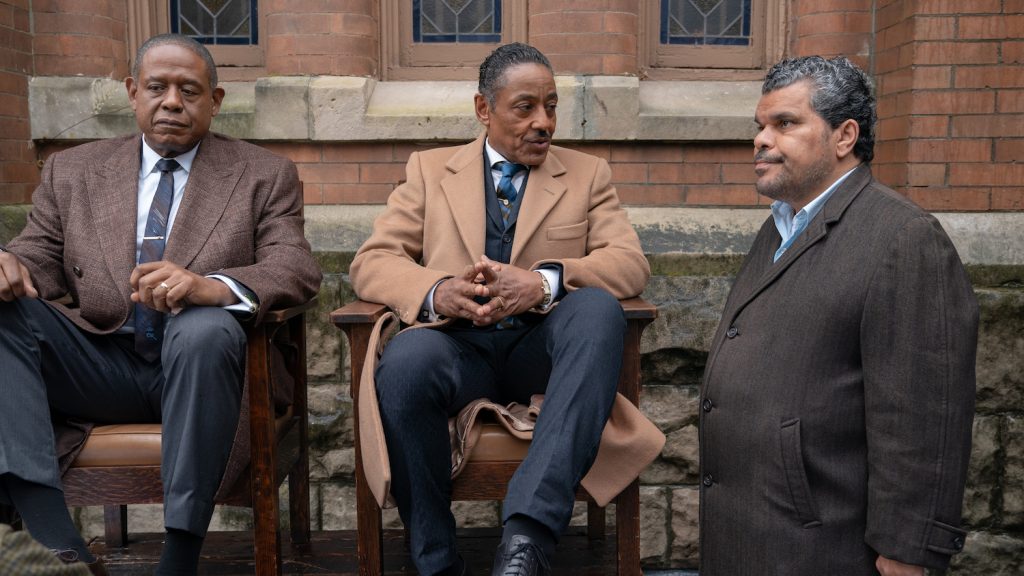
Historically, to roll through rent strikes and through the telling of a story about equality, coupled with a love story about an Italian mobster’s daughter who’s in love with a black kid, you have something that shows issues that still are very relevant in our world today. It’s exciting to get a real sense of the ethnicity of the time and culture and also you get a sense of the importance of what was happening historically as it correlates to what’s happening now.
AF: There’s the powerful scene when Powell learns of JFK’s death. How did it feel to play something with such historical significance?
Esposito: For me, it was very personal, because I’ve known Robert F. Kennedy Jr. for probably about 20 years now. Not only is Robert my friend, but I’ve always respected John F. Kennedy, in a very deep way because my mom, at that time, being an African American woman, respected his ethics, his morals, and his habits in his life.
When she taught me how to swim, she’d say stuff like, “John F. Kennedy was a great swimmer.” She’d always refer to that family in a positive manner, and I’ve since had a chance to meet the children of Robert F. Kennedy as well as read a lot of his books, some of his poetry, and sayings. And I’ve read all about John F. Kennedy as well. Upstanding people who were in service, I think that’s what I really appreciate. The Kennedys are a family in service to others. So to shoot that scene in Powell’s office really had an impact on me.
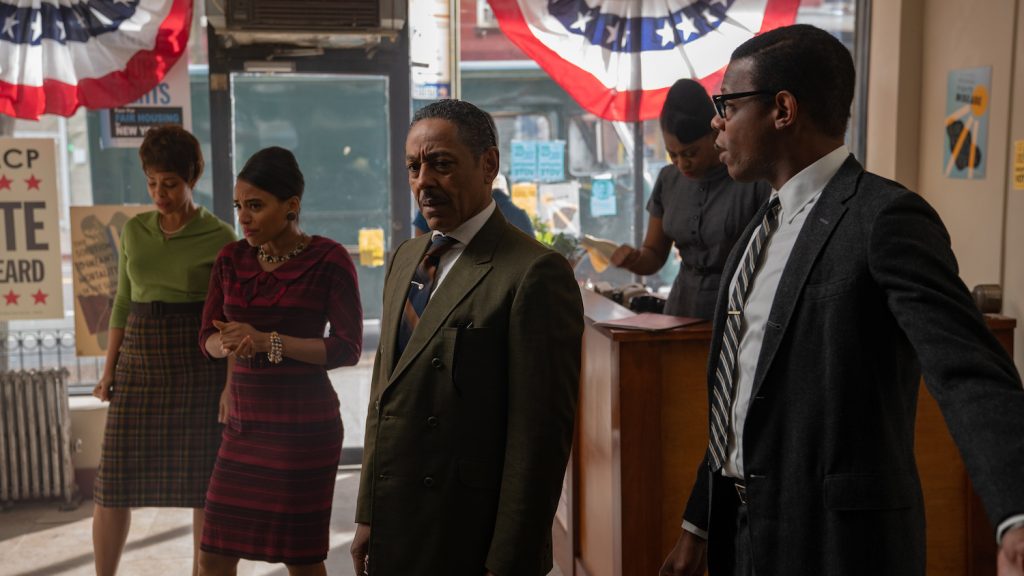
in GODFATHER OF HARLEM
His office was riddled with posters where they inserted my face into photographs with JFK, because in our story, my character knew John Kennedy and was a pal of JFK and Lyndon B. Johnson, but it was Kennedy who he really had an allegiance to. Recreating that moment, especially given my history with the family and my knowledge of JFK, it was an emotional experience for me… very emotional for Powell, probably much more so, because he really thought Jack was the guy to bring African Americans into the spotlight and give them what they’ve deserved for so long.


